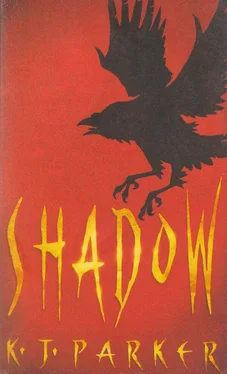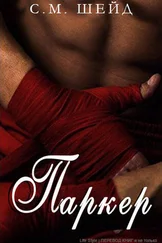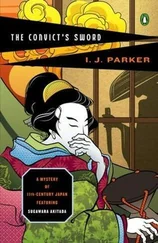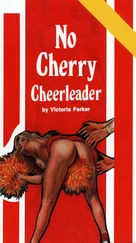K Parker - Shadow
Здесь есть возможность читать онлайн «K Parker - Shadow» весь текст электронной книги совершенно бесплатно (целиком полную версию без сокращений). В некоторых случаях можно слушать аудио, скачать через торрент в формате fb2 и присутствует краткое содержание. Жанр: Фэнтези, на английском языке. Описание произведения, (предисловие) а так же отзывы посетителей доступны на портале библиотеки ЛибКат.
- Название:Shadow
- Автор:
- Жанр:
- Год:неизвестен
- ISBN:нет данных
- Рейтинг книги:3 / 5. Голосов: 1
-
Избранное:Добавить в избранное
- Отзывы:
-
Ваша оценка:
- 60
- 1
- 2
- 3
- 4
- 5
Shadow: краткое содержание, описание и аннотация
Предлагаем к чтению аннотацию, описание, краткое содержание или предисловие (зависит от того, что написал сам автор книги «Shadow»). Если вы не нашли необходимую информацию о книге — напишите в комментариях, мы постараемся отыскать её.
Shadow — читать онлайн бесплатно полную книгу (весь текст) целиком
Ниже представлен текст книги, разбитый по страницам. Система сохранения места последней прочитанной страницы, позволяет с удобством читать онлайн бесплатно книгу «Shadow», без необходимости каждый раз заново искать на чём Вы остановились. Поставьте закладку, и сможете в любой момент перейти на страницу, на которой закончили чтение.
Интервал:
Закладка:
By now he was painfully tired and painfully thirsty. Even so, he didn't fancy the river, at least not until after he'd lugged out the two bodies, lodged in a big patch of briars, whose blood was fouling the water. Then he drank, and that made him feel much better, though not inclined to stir much from where he was lying, belly down, back in the mud again. But it occurred to him that if the bodies he'd just cleared out of the stream were still bleeding, it followed that the fighting must've been quite recent-and that there had been two sides to the fighting, and he didn't know which one he belonged to. It could easily be the case that the friends of one side or the other were out looking for them, that they could show up here at any moment. Of course, they might be his friends too, and overjoyed to see that he'd made it. Or they might not.
He lay in the dirty water, unable to make up his mind. It could be that he was on the home side, that this was his native valley and when his memory came back he'd simply walk home over the hills, have a bath and go to bed. Or he might be the last survivor of a raiding party, trapped a hundred miles behind enemy lines, in which case his only chance of ever getting out alive would be to find his own people quickly, before they gave him up for dead and withdrew. Or they might all be dead, and every living soul he'd be likely to meet would be his enemy, ready to kill him on sight. He thought about that, and realised that he hadn't a clue what he looked like. If he knew that, surely it'd give him some idea of which side he'd been on.
He found a pool large enough to show him his reflection, but the face he saw in it could have been anybody, some stranger. He saw a man with his hair plastered down over his face with mud, a tidemark down one side of his face, traces of clotted blood gathered in the socket of the left eye; two days' growth of beard, a long, straight nose, someone who was either younger than he looked or older than he felt; a mess. No armour, nothing that looked like military uniform or the clothes the other side were wearing (he was thinking of them as the other side, but only because the first body he'd come across was one of the uniformed soldiers) and no empty scabbard or sheath to suggest he'd been carrying a weapon. One civilian left alive, two dozen dead soldiers. Of course, any moment now he'd remember it all and everything would make sense-assuming he lived that long.
Big assumption. Give him five, ten minutes and he'd have his life back again, he'd know what to do. How long would it take for a troop of cavalry to get from the skyline to the river-bank? Two minutes, maybe three. In many ways he wasn't as smart as a crow, but he could figure. It was time to go.
Halfway up the western side of the combe was a small clump of tall, thin trees with a little scrubby patch of ferns and briars tangled round the edge, enough to hide a man in if he didn't mind getting scratched all to hell. It was as good a place as any to lie up and wait for himself to come back. (But if I'm hidden, how will I know where to look for me? Because it's the only scrap of cover in this whole valley, fool. Obvious place to look.) As an afterthought, he dragged a left boot off the nearest dead man and crammed his foot into it-a size too big, much better than a size too small; as a second afterthought, he pulled off the man's cloak and sword-belt, squelched ten paces up the slope, thought about going back to look for a rations bag or a water bottle, decided against it. After all, he'd only be laid up there for half an hour, an hour at most, just as long as it took him to remember himself.
He put up two crows as he bustled a way through the briars; they must hate me, he thought, I've been doing nothing but get in their way ever since I woke up. They circled a couple of times, swearing at him, then headed off due south, flying awkwardly and with obvious effort, like a man wading through mud.
Something was happening down below by the river. He crawled to the edge of the briar tangle, where he could see.
A dozen horsemen, soldiers, were riding at a smart gallop over the opposite crest. As they felt the soft ground under their horses' hooves, they slowed down-dangerously easy for a horse to slip and break a leg on a slope in the mud-and walked the rest of the way. Before they reached the river, the man in front held up his hand, a signal to halt; then he dismounted, gave his reins to the man behind him, and walked carefully (not wanting to go arse over tip in front of the men) to the edge of the muddy slough. Didn't have to see his face to sense the hesitation before he stepped into it-horror at what he was looking at, shock at the death of friends, or he really didn't want to get his shiny black riding boots covered in mud and filth.
The horseman-he was a soldier, no question about it; but infuriatingly, his clothes and armour didn't match with either side, he was wearing a knee-length mailshirt (terrifyingly expensive, and after an hour or so your neck and shoulders start hurting like you wouldn't believe) and a tall conical helmet bulled up to a mirror shine, and a small round shield, bowcase and quiver were slung over his back-the soldier squelched through the mud like a fine lady crossing a farmyard, knelt beside the nearest body and peered at it, lifting the head; gently let it back, moved on to the next, and the next. He was examining the bodies from both sides with the same care and respect (if they were enemy bodies, would you lift the head gently then lower it softly again after you'd looked, or would you just use the toe of your boot?). And he was definitely looking for something or someone, rather than examining them for cause of death or any other evidence of how the fight had gone. Conclusion: they're looking for me. Maybe; or they're looking for someone else who was supposed to be here, but who escaped or got taken away. That was a thought; he'd been assuming that these two dozen dead men had fought to the death, each killing the other in a graceful act of symmetry so as to leave him the perfect puzzle when he came round. Bad assumption, made for the sake of keeping the problem confined. Bad assumption; all assumptions bad, though some worse than others, like assuming the battle had been for or about him, or that it hadn't. This was no time to trust or take chances; better to keep well clear, like the crows, and wait till all the humans had gone and it was safe.
Whatever else the horseman may have been, he was efficient and quick in making his inspection, and when he was through he dragged himself back on his horse (he was tired, too, probably anxious to get home, change into some dry footwear, have something to eat) and gave the signal to move on. They didn't go back the way they'd come, he noticed; instead they followed the combe parallel to the river until they were out of sight over the horizon.
Getting out of the briar tangle was significantly harder than getting in… The brambles ran their fingers down his face and tugged at his clothes like children wanting attention, as if they were sorry to see him go. Affection, he remembered, I guess I've known what that feels like. But it was easier to get out of my life than a patch of briars.
Nothing had changed; still the river, the mud and the bodies. He had a feeling it would get dark in the next hour or so. He still couldn't remember anything, not his name or his nationality, or why he was here or what had happened. For the first time, he made himself contemplate the possibility that he could be like this for days, or weeks-and what would happen to his life while he was away from it? For all he knew it was about to catch fire or boil over, or starve to death; or maybe he'd walk out of this and back into it and nobody would realise he'd even been away. No doubt about it, he was frightened, and the worst part of that was not knowing what he ought to be frightened of. Taking a deep breath, he made a resolution: to be afraid of everything, on principle, until he was sure it was safe. It worked for the crows, after all; and so far they were the only role models for survival that he had.
Читать дальшеИнтервал:
Закладка:
Похожие книги на «Shadow»
Представляем Вашему вниманию похожие книги на «Shadow» списком для выбора. Мы отобрали схожую по названию и смыслу литературу в надежде предоставить читателям больше вариантов отыскать новые, интересные, ещё непрочитанные произведения.
Обсуждение, отзывы о книге «Shadow» и просто собственные мнения читателей. Оставьте ваши комментарии, напишите, что Вы думаете о произведении, его смысле или главных героях. Укажите что конкретно понравилось, а что нет, и почему Вы так считаете.












